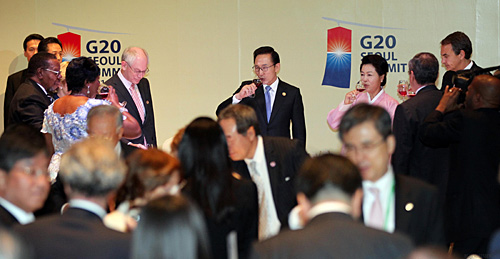|
 |
|
TOAST FOR G20 SUMMIT: South Korean President Lee Myung Bak celebrates the completion of the G20 Summit in Seoul on November 12 (XINHUA/YONHAP) |
While dealing with the debt crisis has been labeled the top priority, the implementation of the Lisbon Treaty remains stagnant. Within the EU, member countries are competing fiercely for power. This has hindered the union from enhancing its diplomatic capabilities and has, thus, kept it from acquiring a higher international status.
This year, the EU focused on redefining its external relations. It believed its prosperity and security are increasingly dependent on changes in the external world. And it held emerging countries with varied values and interests are fully participating in the reconstruction of international systems.
Based on these two judgments, the EU set new diplomatic objectives: playing an effective leading role in global affairs, defending European values and interests, cooperating with emerging countries and urging them to achieve a balance between their rights and responsibilities.
The new Strategic Concept brought forward at the NATO Summit in Lisbon in November reflected the security concerns of European countries. It showed the situation in Afghanistan, non-traditional security threats and the development direction of emerging economies have become the three major concerns of European countries. It also stressed the use of political and diplomatic means to solve disputes and even prevent the occurrence of disputes, while military means should only be used as a supplement.
Competition for leadership
Due to its prominence, the Group of 20 (G20) has become a stage for major powers to compete for dominance in the new international order. And the framework for a balanced growth of the global economy and the reform of international financial institutions are the focus of the competition.
At the November G20 Summit in Seoul, competition for the rule-making power was extremely fierce. Although the United States could not monopolize all the agendas, it still dominated important ones concerning its interests. In addition, it tried its best to protect its status as the G20 rule maker.
Although the G20 is divided into two camps—developed and developing countries—differences remain within the camps. Countries often form loose groups based on their own interests and are far from reaching a true consensus.
Amid the competition for leadership in the international system, Western powers aspire not only to protect their vested interests, but also to guide the development of the international system in their favor. Emerging powers—including China—however, expect a status that matches their strength and future prospects.
As the international situation continues to evolve, conflicts between the two sides will likely become more intense and complicated.
The author is a researcher with the Department of Global Strategy of the China Institute of International Studies | 